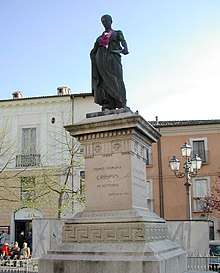Gaius Sallustius Crispus (86 – 34 BC) was a statesman and historian during the last century of the Roman Republic.
Quotes

Only a few prefer liberty, the majority seek nothing more than fair masters.
- As the blessings of health and fortune have a beginning, so they must also find an end. Everything rises but to fall, and increases but to decay.
- As quoted in The Cyclopaedia of Practical Quotations: English and Latin (1894) edited by J. K. Hoyt and Anna L. Ward, p. 508
Bellum Catilinae (c. 44 BC)
- Satis eloquentiae, sapientiae parum.
- Plenty of eloquence, not enough wisdom (said of Catiline)
- Nam divitiarum et formae gloria fluxa atque fragilis est, virtus clara aeternaque habetur.
- Sed nostra omnis vis in animo et corpore sita est; animi imperio, corporis servitio magis utimur; alterum nobis cum dis, alterum cum beluis commune est.
- Verum ubi pro labore desidia, pro continentia et aequitate libido atque superbia invasere, fortuna simul cum moribus immutatur. Ita imperium semper ad optimum quemque a minus bono transfertur. (II)
- But when sloth has introduced itself in the place of industry, and covetousness and pride in that of moderation and equity, the condition of a state is altered together with its morals; and thus authority is always transferred from the less to the more deserving.
- Sed multi mortales dediti ventri atque somno, indocti incultique vitam sicuti peregrinantes transiere.
- Yet many human beings, resigned to sensuality and indolence, un-instructed and unimproved, have passed through life like travellers in a strange country.
- Chapter II
- Yet many human beings, resigned to sensuality and indolence, un-instructed and unimproved, have passed through life like travellers in a strange country.
- Quod si regum atque imperatorum animi virtus in pace ita ut in bello valeret, aequabilius atque constantius sese res humanae haberent neque aliud alio ferri neque mutari ac misceri omnia cerneres. Nam imperium facile iis artibus retinetur, quibus initio partum est. Verum ubi pro labore desidia, pro continentia et aequitate lubido atque superbia invasere, fortuna simul cum moribus inmutatur. Ita imperium semper ad optumum quemque a minus bono transferetur.
- And, indeed, if the intellectual ability of kings and magistrates were exerted to the same degree in peace as in war, human affairs would be more orderly and settled, and you would not see governments shifted from hand to hand, and things universally changed and confused. For dominion is easily secured by those qualities by which it was at first obtained. But when sloth has introduced itself in the place of industry, and covetousness and pride in that of moderation and equity, the fortune of a state is altered together with its morals; and thus authority is always transferred from the less to the more deserving.
- Chapter II, sections 3-6; translation by Rev. John Selby Watson
- And, indeed, if the intellectual ability of kings and magistrates were exerted to the same degree in peace as in war, human affairs would be more orderly and settled, and you would not see governments shifted from hand to hand, and things universally changed and confused. For dominion is easily secured by those qualities by which it was at first obtained. But when sloth has introduced itself in the place of industry, and covetousness and pride in that of moderation and equity, the fortune of a state is altered together with its morals; and thus authority is always transferred from the less to the more deserving.
- Sed ego adolescentulus initio sicuti plerique studio ad rem publicam latus sum, ibique mihi multa adversa fuere. Nam pro pudore, pro abstinentia, pro virtute, audacia, largitio, avaritia vigebant.
- I myself, however, when a young man, was at first led by inclination, like most others, to engage in political affairs; but in that pursuit many circumstances were unfavorable to me; for, instead of modesty, temperance, and integrity, there prevailed shamelessness, corruption, and rapacity.
- Chapter III
- I myself, however, when a young man, was at first led by inclination, like most others, to engage in political affairs; but in that pursuit many circumstances were unfavorable to me; for, instead of modesty, temperance, and integrity, there prevailed shamelessness, corruption, and rapacity.
- Ambitio multos mortales falsos fieri subegit, aliud clausum in pectore, aliud in lingua promptum habere, amicitias inimicitiasque non ex re, sed ex commodo aestimare, magisque vultum quam ingenium bonum habere.
- Ambition prompted many to become deceitful; to keep one thing concealed in the breast, and another ready on the tongue; to estimate friendships and enmities, not by their worth, but according to interest; and to carry rather a specious countenance than an honest heart.
- Chapter X, section 5
- Variant translation: It is the nature of ambition to make men liars and cheats, to hide the truth in their breasts, and show, like jugglers, another thing in their mouths, to cut all friendships and enmities to the measure of their own interest, and to make a good countenance without the help of good will.
- Ambition prompted many to become deceitful; to keep one thing concealed in the breast, and another ready on the tongue; to estimate friendships and enmities, not by their worth, but according to interest; and to carry rather a specious countenance than an honest heart.
- Nam idem velle atque idem nolle, ea demum firma amicitia est.
- For to like the same things and to dislike the same things, only this is a strong friendship.
- Chapter XX, 4; quoting Catiline
- For to like the same things and to dislike the same things, only this is a strong friendship.
- Nonne emori per virtutem praestat quam vitam miseram atque inhonestam, ubi alienae superbiae ludibrio fueris, per dedecus amittere?
- Is it not better to die in a glorious attempt, than, after having been the sport of other men's insolence, to resign a wretched and degraded existence with ignominy?
- Chapter XX, section 9; quoting Catiline
- Is it not better to die in a glorious attempt, than, after having been the sport of other men's insolence, to resign a wretched and degraded existence with ignominy?
- At nos non imperium neque divitias petimus, quarum rerum causa bella atque certamina omnia inter mortales sunt, sed libertatem, quam nemo bonus nisi cum anima simul amittit.
- Omnes homines, patres conscripti, qui de rebus dubiis consultant, ab odio, amicitia, ira atque misericordia vacuos esse decet.
- Necessitas etiam timidos fortes facit.
- Necessity makes even the timid brave.
- Chapter LVII
- Necessity makes even the timid brave.
Bellum Iugurthinum
Histories
Epistulae ad Caesarem senem
- Sed res docuit id verum esse, quod in carminibus Appius ait, fabrum esse suae quemque fortunae.
- But experience has shown that to be true which Appius says in his verses, that every man is the architect of his own fortune.
- I.i.2
- But experience has shown that to be true which Appius says in his verses, that every man is the architect of his own fortune.
Disputed
- He that will be angry for anything, will be angry for nothing.
- This had appeared as an anonymous maxim as early as 1844; the first attribution to Sallust yet found is in The Voice of Wisdom, A Treasury of Moral Truths from the Best Authors (1883) edited by J. E.
Misattributed
- Ambition breaks the ties of blood, and forgets the obligations of gratitude.
- The earliest attributions of this yet found are to it being a saying of William Scott, 1st Baron Stowell, in History of the Anti-Corn Law League (1853), by Archibald Prentice, p. 54; around 1876 it began to began to be cited to W. Scott, and then around 1880 sometimes to Walter Scott, but without citations of source, including a variant: "Selfish ambition breaks the ties of blood, and forgets the obligations of gratitude" in a publication of 1907. It seems to only recently to have begun to be attributed to Sallust, on the internet.
- Think like a man of action, and act like a man of thought.
- Henri Bergson, as quoted in The Forbes Scrapbook of Thoughts on the Business of Life (1950), p. 442; this only seems to have become attributed to Sallust in the early 21st century.
Quotes about Sallust
- I think Sallust inferior to both Livy and Tacitus in the talents of an historian. There is a lecturing, declaiming, tone about him which would suit a teacher of rhetoric better than a statesman engaged in recording great events. Still, he is a good writer; and the view which he here gives of the state of parties at Rome, and the frightful demoralization of the aristocracy, is full of interest.
- Thomas Babington Macaulay, note dated June 10, 1835, in The Life and Letters of Lord Macaulay, ed. G. Otto Trevelyan, Vol. I (1875), Appendix, pp. 410–411
- Let the prince be ever mindful of Sallust's teaching that neither soldiers nor money can defend a king but only friends won by good deeds, merit, and honesty.
- Joanot Martorell, in Tirant lo Blanch (1490), as translated by David H. Rosenthal (1984), p. 245; the bolded portion of this, which seems to be a summation or paraphrase is sometimes presented as a quote of Sallust.
External links
- Latin with English translation
- at LacusCurtius (J. C. Rolfe, 1921):
- Bellum Catilinae
- Bellum Iugurthinum
- Invectiva in Ciceronem (uncertain authorship, sometimes attributed to Sallust)
- Oratio ad Caesarem (uncertain authorship)
- Works by Sallust at Project Gutenberg (Schmitz and Zumpt, 1848):
- Bellum Catilinae
- Bellum Iugurthinum
- at Perseus:
- Bellum Catilinae
- Bellum Iugurthinum
- at Attalus.org:
- Fragmenta Historiarum (translation of selected fragments)
- Fragmenta Historiarum (Latin text of all surviving fragments)
- at Latin Teaching Materials (2007)
- Bellum Catilinae
- Latin only
- at Latin Library (unknown edition):
- Bellum Catilinae
- Bellum Iugurthinum
- Fragmenta Historiarum
- Epistolae ad Caesarem
- Invectiva in Ciceronem
- English translation only
This article is issued from
Wikiquote.
The text is licensed under Creative
Commons - Attribution - Sharealike.
Additional terms may apply for the media files.

